|
|
|
Sort Order |
|
|
|
Items / Page
|
|
|
|
|
|
|
| Srl | Item |
| 1 |
ID:
075992
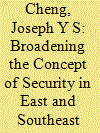

|
|
|
|
|
| Publication |
2006.
|
| Summary/Abstract |
External threat plays a diminishing role in the foreign policies of China and the Association of Southeast Asian Nations (ASEAN). Some version of modernization diplomacy is pursued so that economic interests are accorded priority. It is in this context that they have gradually adopted comprehensive security and similar concepts. At the individual level, aspirations and security are also realized in the context of satisfactory economic development. At the international level, regional economic co-operation associated with market liberalization is perceived as an important means to maintain a peaceful external environment and to promote economic growth. The concept of security is thus both broadened and extended to link up the international, regime and individual levels. The Asian financial crisis exposed the contradictions between the developed countries of the West and the developing economies in the Asia-Pacific region; it also challenged the dominant domestic political coalitions in Southeast Asia based on existing development strategies. New alignments therefore have to be established within the Asia-Pacific region to ensure effective interest articulation within the World Trade Organization (WTO) framework, and the shaking of the foundation of the regional regimes produced varied responses ranging from defensive adjustment to offensive adjustment and fundamental economic restructuring. Values and aspirations on the part of individuals have to be redefined too. The threat of terrorism was first highlighted by the September 11 Incident, but terrorism in the region was largely rooted in domestic ethnic and socio-economic contradictions and exacerbated by economic difficulties in the wake of the Asian financial crisis. The threat of terrorism has in turn alerted the regional governments to the issues of radical Islam, the widening gap between the rich and poor and inter-ethnic relations, as well as to a whole range of non-traditional security issues. In short, comprehensive security must include good governance.
|
|
|
|
|
|
|
|
|
|
|
|
|
|
|
|
| 2 |
ID:
097852
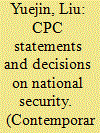

|
|
|
| 3 |
ID:
132131
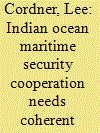

|
|
|
|
|
| Publication |
2014.
|
| Summary/Abstract |
Maritime security in the Indian Ocean Region (IOR) is a central issue for regional and extra-regional actors. Traditional and non-traditional security challenges largely converge at sea as they impact economic, environmental, energy, human, food and national security. As the major regional power and an emerging Asian great power, India's willingness and capacity to provide strategic leadership is critical to engendering a cooperative spirit of shared destiny. India's growing naval capabilities indicate a strong commitment to maritime security. However, its strategic policy ambiguity and lack of transparency undermines trust and confidence. Allegations of civil-military dissonance and the lack of political will for reform raises questions about strategic competence. India's willingness and capacity for cooperative regional security leadership presents regional risks. The new Indian government is presented with significant challenges to reform domestic politico-bureaucratic-military arrangements in order to enhance external and internal consistency and credibility, and improve openness and coherency.
|
|
|
|
|
|
|
|
|
|
|
|
|
|
|
|
| 4 |
ID:
082862
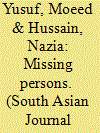

|
|
|
| 5 |
ID:
140337
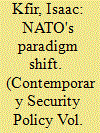

|
|
|
|
|
| Summary/Abstract |
Although recent years have seen more talk about Article 5 and the need for NATO to stand up to an expansive Russia, NATO states are unlikely to engage in a new Cold War with Russia. Instead the alliance continues to explore its agenda in the post-Afghanistan and post-Crimea period. One answer to these tensions is to develop an agenda stressing human security to counter the pervasive threats of regional instability and terrorism. After reviewing the alliance's Military Concept Against Terrorism (MCAT), the deliberations of the 2012 Chicago and 2014 Wales Summits, and the European Union's Common Defence and Security Policy (CSDP), this article explores two propositions. First, that the vacillating commitment of alliance members who chose to address security issues through EU mechanisms or optional coalitions of the willing threatens NATO's relevance. If NATO's members are unclear about the alliance's agenda and identity, others cannot know what the alliance is willing to do to protect its interests. Second, by developing Military Concept against Terrorism and Smart Defence along a human security framework coupled with maritime operations would enable the alliance to better satisfy the needs of its European members, allowing them to employ NATO to support the EU's Common Defence and Security Policy, and ensure a continued reliance on NATO. As one area where there is a consensus between NATO's European members and the USA, counterterrorism is the most promising field that the alliance can focus on. NATO, therefore, should position itself as a key counterterrorism force, albeit one that is not strictly kinetic.
|
|
|
|
|
|
|
|
|
|
|
|
|
|
|
|
| 6 |
ID:
103829


|
|
|
|
|
| Publication |
New Delhi, Observer Research Foundation, 2010.
|
| Description |
206p.
|
|
|
|
|
|
|
|
|
|
|
|
Copies: C:1/I:0,R:0,Q:0
Circulation
| Accession# | Call# | Current Location | Status | Policy | Location |
| 055925 | 303.625/IND 055925 | Main | On Shelf | General | |
|
|
|
|
| 7 |
ID:
084188


|
|
|
| 8 |
ID:
112831


|
|
|
|
|
| Publication |
2012.
|
| Summary/Abstract |
The China-US relationship is a multidimensional complex one involving both traditional and nontraditional security issues. However, nontraditional security issues (NTS) have become paramount in reshaping Sino-US relations, though there is no absolute boundary between NTS and traditional security. With both traditional security issues and NTS issues being solved according to the involved nations' prior experience in dealing with traditional security matters, it stands to reason that there is a very fine line, if that, between NTS and traditional security and that they are not necessarily mutually exclusive. Although the energy threat is more likely to be considered a traditional security matter than concerns such as the terrorism threat or climate change issue, the energy threat actually contains some NTS characteristics, like how to get full use of natural resources and the relevance with climate change. This article, to some extent, explains the dynamic between traditional and nontraditional security through the case study of China-US relations.
|
|
|
|
|
|
|
|
|
|
|
|
|
|
|
|
| 9 |
ID:
090352


|
|
|
| 10 |
ID:
099595


|
|
|
| 11 |
ID:
137945
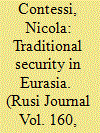

|
|
|
|
|
| Summary/Abstract |
The brewing conflict over the division of resources located in the Caspian Sea has long been cited as a driver of the growth in naval capabilities of the five littoral states. However, to focus on this aspect would be to neglect the political and diplomatic advances of recent years, as well as other local and global geopolitical factors that have contributed to increased tension. Nicola Contessi explores the intricate dynamics at play in the region and the ongoing efforts to unpick them, arguing that while the 2014 Astrakhan Summit did not herald the breakthrough hailed by the five participants, it did mark a step towards resolution.
|
|
|
|
|
|
|
|
|
|
|
|
|
|
|
|
| 12 |
ID:
064815


|
|
|
| 13 |
ID:
097702


|
|
|
|
|
| Publication |
2009.
|
| Summary/Abstract |
This article takes an in-depth look at the Niger Delta crisis from two divergent but
mutually reinforcing security conceptions, namely national versus people security. It
contends that while the Nigerian government views security from the traditional statecentric
viewpoint and accordingly acts to 'secure' the region, the people view security
from a broader human-centric perspective, and thus responds negatively to state
securitisation/militarisation. This clash of security perspectives sets the stage for and
perpetuates armed conflict in the region as the net result of both sides' insistence on
'securing' their interests, resulting in a situation of mutual antagonism as they bring
to bear their often considerable coercive capacities. Therefore, the broad question the
paper grapples with is whose security is paramount, and against what threats is it aimed.
It reaffirms the need for a paradigm shift in the focus on security by the Nigerian
state from a state-centric perspective that views the people's agitation/resistance as
'terrorism', to a human-centric perspective that will justify its Lockean essence. This is
essential, because the federal government's militarisation of the region fans the flames of
ethnic-nationalism, exacerbating violence and perpetuating criminality with attendant
destabilising consequences for Nigeria's economy and statehood.
|
|
|
|
|
|
|
|
|
|
|
|
|
|
|
|
|
|
|
|
|